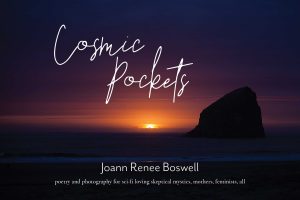 Review by Barbara Ellen Sorensen
Review by Barbara Ellen Sorensen
In her debut book, Cosmic Pockets, Joann Renee Boswell’s poetry is kinetic and visceral. Interspersing poetry with original photography, her words seem to lift off the page and the reader is immediately suctioned into a raucous, effervescent and hopeful world. Whimsical in tone, yet entirely meditative, these poems sparkle with the recognition that even with chaos there is growth and progress.
Boswell is fearless in experimenting with poetic form using calligrams and concrete structures. Enchantingly apropos amidst the calamitous rioting, and careless deliberations of the current administration, Boswell’s poetry seems to pull back to early 20th century poetry. Some of Boswell’s poetry is reminiscent of the surrealism of the French poet Guillaume Apollinaire and the art manifestos of the avant garde. Perhaps in this time of memes and video-taped horrors, Boswell is not so much breaking new ground as she is showing us a path forward by simply going back. The difference, however, is that Boswell’s poems are decidedly feminine and female-aware.
Boswell speaks to women by shining a light on the fact that women are so busy taking care of everyone else they often ignore their own bodies: “I spent the summer assessing damage/from seven years of creating life while/neglecting non urgent self needs:/eighteen medical visits in four months…”(116) and then, “I am empty of me/drowned in endless others’ needs.” (101)
Often, too, women are not fully acknowledged by the medical establishment: “helpless against the system/I amp up, determine to be heard/hurl my voice, cog their wheel/refuse to mindlessly acquiesce/to their script and schedule.” (109)
The reader traverses with Boswell through her years of college and in breaking away from her parents’ Evangelical beliefs as in the poem “Portland Peace Rally, 2003.” Here she tells her mother about the rally she participated in and is told harshly that it was wrong: “Baffled, I listen as her fear boils into rage: where did I learn to disrespect the man God/assigned the presidency? Christians must obey God, and he gave us a leader.” (47)
Ultimately, Boswell arrives at a place of forgiveness: “I cannot blame them–/just another set of parents passing/nutritionally-empty tradition:/girls will be safe,/boys will be boys… Instead … I’ll seek where knowledge/drops, devour, ravenous glutton/feast … Trust this self-compassion/will multiply, like loaves and fish,/prove to be untameable contagion.” (64)
Boswell brings the readers along through her experiences of childbirth, premature births, collciky babies, and the fear of bringing up children in a country of unrelenting violence: “no more children/while children kill children and America refuses/to adapt. period, crest, crash, blast gnarly truth and unrelenting until we turn the/tide.” (168)
Boswell finds strength in identifying with Biblical mothers: “Miriam with Moses,/steady his basket with one hand/shhh lilting through silent tears/final lullabye.” (172) And she gathers female power by declaring: “I Am Egg/the height of potential…/Divine power indwelling.” (177)
Boswell tackles immigration issues and how love is truly the answer: “you have persisted in praising cookie-cutter peers, demonizing the Divine dwelling in your diverse neighbors–/so focused on law and blood/you forget what matters/Love.” (193)
Toward the end of the book Boswell’s poetry shifts to the exploration of a modern Christ-figure. In her eyes, Christ is the ultimate “alien” and is the literal future as well as the past. She asks us to see Christ in a new way as a “Cosmic Christ” one that transcends time and place. (197)
Hope springs eternal in this book. This is a book for seekers. The poet is a seeker herself and has not yet arrived at a comfortable place with God. And maybe that is enough: “Embrace the empty expanse…accept our brief flaking existence.” (275)
Finally, in Boswell’s world every belief system boils down to science and science is mystery, as is God: “In the beginning was the Singularity…and the Singularity was God.” (285) The study of both is worthy: “Cosmology meet Theology–you are the same.” (285) And because both will never be totally understood, we must create to know: “I will create as I seek.”(292)
Cosmic Pockets by Joann Renee Boswell
Fernwood Press, 2020.
ISBN: 978-1-59498-069-5
Paper, 305pp
Barbara Ellen Sorensen is former senior editor of the American Indian Science & Engineering Society’s flagship publication, Winds of Change. Sorensen is a contributing writer to the Tribal College Journal. Sorensen has had three books of poetry published: Songs from the Deep Middle Brain (Main Street Rag, 2010), Compositions of the Dead Playing Flutes (Able Muse Press, 2013), and Mary’s River (Kelsay Books, 2018). Her first book was nominated in 2011 for a Colorado Book award.
